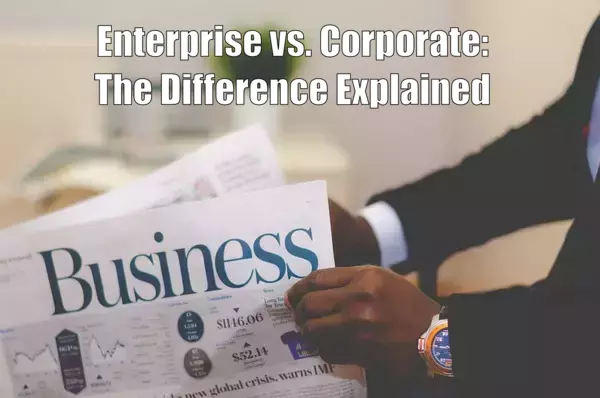Determining the name of a company can be a daunting task, as it creates a lasting impression. While the term “enterprise” refers to any business, “corporation” is reserved for companies that have undergone a legal process of incorporation.
Incorporation makes the business an entity separate from its founder, thus protecting their personal assets. Corporations have tax obligations, can hire employees, borrow money, and even sue and be sued. Non-profit and for-profit organizations can become incorporated. Adding the word “enterprise” to a company’s name does not hold any legal implications.
While people use the terms “organization,” “enterprise,” and “corporation” interchangeably, each has a specific meaning in its context. An organization refers to a group of people working together to manage economic, social, or political activities. An enterprise is a business venture established to carry out activities, such as manufacturing a product or providing a service. Becoming a corporation means legally incorporating a business according to strict state laws. Corporations can be C or S types, while enterprises don’t have the same strict legal implications.
Both enterprises and organizations can be formal or informal, distinguished by registration and regulation. Informal enterprises and organizations lack official structures and reporting mechanisms. The major difference between organization and enterprise is that the latter is profit-oriented, while the former is goal-oriented.
Enterprises aim to generate revenue by addressing unmet customer needs. The success of an enterprise depends on how efficiently it is organized, comprising teams working together towards a common goal. Organizing the enterprise involves developing a structure and allocating resources. Proper organization reduces redundancies, avoids miscommunications, and eliminates waste.
| Differences | Enterprise | Corporate |
|---|---|---|
| Size | Typically large, with multiple locations and many employees | Can range from small to large, but often have centralized operations |
| Ownership | May be privately or publicly owned, often with a focus on growth and expansion | Typically publicly owned, with a strong focus on maximizing shareholder value |
| Structure | Hierarchical, with clear divisions of labor and decision-making authority | Hierarchical, but with greater emphasis on collaboration and cross-functional teams |
| Culture | Often innovative and nimble, with a willingness to take risks and embrace change | More traditional and risk-averse, with a focus on stability and consistency |
| Goals | Focused on maximizing market share and profitability | Focused on delivering value to shareholders and meeting financial targets |
| Approach to risk | Often willing to take calculated risks in pursuit of growth opportunities | Generally more risk-averse, with a focus on minimizing risk and enhancing stability |
Legal Process of Incorporation
While the word enterprise can be used to describe any company or business, the word corporation is reserved for businesses that have completed a legally binding process. Incorporation means that the business is an entity separate from the person who founded it. In order to become incorporated, a company’s owners and shareholders file an application with the secretary of state in the business’s primary state of operation.
Once a company is incorporated, it is referred to as a legal person, with rights and obligations such as paying taxes, borrowing money, and entering into contracts. Incorporation is chosen by professionals and entrepreneurs to protect their personal assets, so that in the event of a lawsuit, their personal assets are not at risk. Both nonprofit and for-profit organizations can become incorporated, and the process involves filing an application with the state of operation.
While the terms enterprise, corporation, and incorporated are sometimes used interchangeably, they have distinct meanings. Incorporation is a legal process that must be completed to ensure that a company is recognized as a separate legal entity. On the other hand, an enterprise is a more general term for a business, and any company can be referred to as an enterprise. While some people choose to reserve the word enterprise for start-ups or innovative new companies, it does not have any legal implications.
When it comes to using the words corporation or incorporated, or the abbreviation “inc.” in a company’s name, these terms are reserved for incorporated companies. These terms mean that the business is run in accordance with the laws of the state that govern corporations. The use of these terms indicates that a company has completed the legal process of incorporation and is recognized as a separate legal entity from its owners or shareholders. In contrast, the word enterprise can be used informally by any company without any legal implications.
Separation of Personal Assets from Business
Operating and owning a business involves various risks, such as claims and lawsuits, making asset protection crucial. A comprehensive plan uses legal strategies to isolate personal and business assets from creditors. LLC and corporation are popular structures that insulate personal assets, but the business assets remain vulnerable to those creditors.
Even with an LLC or corporation, protecting business assets from creditors presents a dilemma. Assets inside the business form are vulnerable to business creditors but protected from the owner’s personal creditors. Conversely, assets kept outside of the business form are vulnerable to the owner’s personal creditors but protected from the business’s creditors.
The solution lies in using holding and operating companies. A holding company has no operations of its own but solely exists to protect assets. The operating company conducts all business operations, but its assets transfer to the holding company to avoid seizure. This structure separates personal assets from business, and business assets from business creditors.
The use of holding and operating companies creates a separation of personal assets from business. Through the holding and operating company structure, business owners can protect their assets from both personal and business creditors. With a strong asset protection plan in place, a business owner can focus on running the business successfully without worrying about potential risks.
Rights and Obligations of a Corporation
Enterprise is a general term for any business while corporation is specifically reserved for legally bound businesses. Incorporation involves a legal process that establishes the business as a separate entity from its founder. As a legal person, a corporation enjoys certain rights and obligations including paying taxes, hiring people, and entering into contracts. These are crucial defenses that protect the personal assets of owners from legal action taken against the corporation.
It is essential to understand the precise legal and practical differences between a company, enterprise, and corporation. A company is a collection of individuals doing business. It must have multiple stakeholders with ownership stakes in the business. In comparison, an enterprise is a general term for any business, from a startup to an established firm. A corporation is a type of larger-scale business that has gone through the legal process of incorporation. This establishes a separate entity from its founder and protects personal assets from potential lawsuits or financial setbacks.
Incorporation offers several advantages over other business structures and insulates owners financially and legally. These include distinct legal limitations, the right to sue or be sued, and the ability to borrow money. A corporation is a legal person that enjoys certain rights and obligations, such as the ability to pay taxes, hire people, and enter into contracts. These factors make incorporation attractive to companies that have grown large enough that financial issues could be devastating to the individuals who founded it.
While incorporation offers significant protections, it may not be suitable for every business. Smaller companies may wish to stay unincorporated for greater control and less risk of taking on large amounts of debt. However, for those who choose to incorporate, the advantages are numerous. Ultimately, the decision to incorporate depends on the business’s specific goals and needs.
Use of Title: Enterprise Vs. Corporation
An enterprise is a more general term that can be used to describe any type of business. It is a collection of individuals working together to achieve a common goal. On the other hand, a corporation is a legal entity that has completed a process of incorporation. This process separates the corporation from its founder and protects them from any financial or legal blowback due to the corporation’s activities or eventual bankruptcy.
Companies can be considered a type of enterprise, with ownership stakes divided among multiple people. When two or more siblings start a business together, they are forming a company. This basic and distinct legal entity separates individuals from commercial organizations. A corporation, on the other hand, is a larger business that has gone through a distinct legal process that grants it several key rights and obligations.
As corporations are treated as distinct and separate entities from the owners, all corporations can pay taxes, borrow money, hire individuals, enter into contracts, and sue or be sued. The process of incorporation means that the business itself is an entity completely separate from the person who founded it. This way, if a disgruntled customer sues the corporation, the owner’s personal assets will not be at risk. As a legal person, a corporation is granted many of the same rights and protections as individuals.
While the terms corporation and enterprise are often used interchangeably, it is important to remember their distinct meanings. Anyone can call their company an enterprise, even adding that word to the company’s official name. However, the word corporation is reserved for businesses that have completed a legally binding process. Filing an application with the secretary of state in the company’s primary state of operation is required for incorporation. Once completed, the company can legally use “incorporated” or “inc.” in its name, signifying that it runs the business in accordance with the laws governing corporations in its state.
Difference in Legal Implications
Determining the name of a company is important as it gives first impressions and needs to be memorable. The terms enterprise and corporation are often misused interchangeably. The term enterprise represents the general term for a business and can be used for any company. On the other hand, the term corporation is reserved for businesses that have completed a legal process of incorporation. This means that the business is a separate entity from the person who founded it, protecting the owner’s personal assets in case of a lawsuit. Corporations have rights and obligations similar to legal people.
All companies are businesses, but legal documents require more precise terms. A company is a collection of individuals doing business, whereas a business can be run by a single person. A corporation is a larger business that has gone through the process of incorporation. Becoming incorporated grants advantages to a business, including distinct legal limitations and financial and legal insulation from the owners. Corporations are treated as separate entities from the owners, similar to companies and enterprises.
Incorporation is suitable for businesses that become large enough that financial issues or drawbacks could be devastating to the founders. However, smaller companies may wish to stay the same, depending on various factors ranging from control to the risk of debt. An incorporated company is any business that has gone through a legal process, granting them several key rights and legal obligations.








